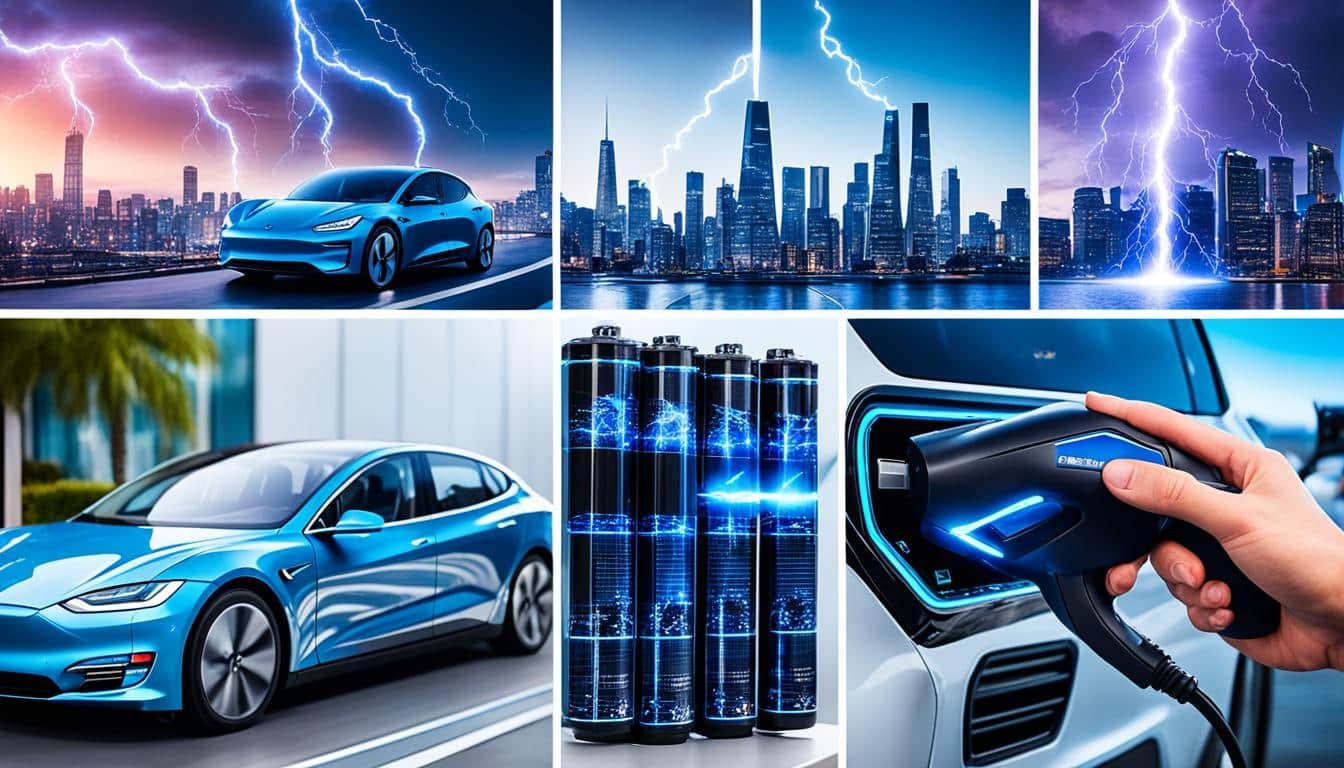Future Of Electric Vehicles are changing fast, thanks to better battery tech. Engineers are pushing to make batteries that are more efficient, cheaper, and better for the planet. This piece looks at the popular lithium-ion batteries and the new kids on the block: nickel manganese cobalt (NMC) batteries, solid-state batteries, and lithium-sulfur batteries.
The article shines a light on the big names in EV battery advancement, like the U.S. Department of Energy and Toyota. It talks about what makes a good battery, like how fast it can charge, how much energy it can store, and how cheap it is. We also tackle the safety and how long batteries last because these things really matter for the future of EVs.
What’s next for electric vehicles is pretty exciting. We’re talking about cars that can drive farther and charge up quicker. But there are big hurdles to overcome, like how to make batteries on a large scale and without harming the planet. Plus, we’ll touch on cool ideas for the future, like charging without wires and batteries made of tiny nanowires.
Key Takeaways
- Advancements in battery technology are crucial to unlocking the full potential of electric vehicles (EVs).
- The article explores the industry-standard lithium-ion batteries as well as emerging alternatives, including NMC batteries, solid-state batteries, and lithium-sulfur batteries.
- Key players driving EV battery innovation, such as the U.S. Department of Energy and Toyota, are highlighted.
- Charging speed, energy density, and cost considerations are evaluated for different battery types.
- Safety and durability factors are examined, as reliable and long-lasting battery systems are essential for the future of EVs.
Introduction to Electric Vehicle Battery Technology
Electric vehicles (EVs) rely on their advanced battery tech. This tech has seen big jumps in the recent past. The world is moving to more eco-friendly transport, making top-notch, efficient batteries vital. The EV field changes daily, from lithium-ion to new options like nickel manganese cobalt (NMC) and solid-state batteries.
Importance of Battery Advancements for EVs
For the EV industry’s future, better batteries are key. Improving how batteries store power, how fast they charge, and efficiency will make EVs better. This makes driving further, costing less, and becoming more popular easier. Better batteries mean electric cars won’t have range problems and will be attractive to more people.
Overview of Current Battery Technologies
Lithium-ion batteries are the main choice for EVs now. But, new options are on the rise. NMC batteries are stepping up with more stored energy, and they are safer too. Solid-state batteries show the most promise with their high energy, fast charging, and safety but they’re still being worked on.
Knowing about today’s EV battery tech is important for what’s coming next. Developers are looking to make batteries that last longer, charge quicker, and are safer. The push for these advancements will drive the EV market forward.
Lithium-Ion Batteries: The Industry Standard

In the electric vehicle (EV) market, lithium-ion batteries are now the top choice. They are the lifeblood of eco-friendly cars. Automakers around the globe prefer them for their many benefits.
One major plus of lithium-ion battery technology is that it’s both light and powerful. They’re small but mighty, perfect for today’s EVs. No matter the weather, they work well, giving cars a dependable drive.
Advancements over time have made lithium-ion batteries safer and faster to charge. They are more eco-friendly too. This progress has made them unbeatable as the best choice for EVs, ensuring smooth drives for their owners.
There are other types like LFP and NMC, but lithium-ion technology still leads. The main reasons are their proven production methods and long life. They are a budget-friendly and reliable pick for car companies and buyers.
| Advantage | Description |
|---|---|
| Lightweight | Lithium-ion batteries offer a high energy density, allowing for a compact and lightweight design that is well-suited for EV applications. |
| Efficient Performance | These batteries excel in a variety of temperature conditions, ensuring reliable and consistent performance in diverse climates. |
| Advancements in Technology | Continuous improvements in charging speed, safety, and sustainability have further solidified lithium-ion as the industry standard for EV batteries. |
| Established Manufacturing | Well-developed manufacturing processes and a strong life cycle make lithium-ion batteries a cost-effective and reliable choice for EV manufacturers. |
“Lithium-ion batteries have become the backbone of the electric vehicle revolution, offering a reliable and efficient power source that is well-suited for the demands of modern EVs.”
Emerging Battery Technologies
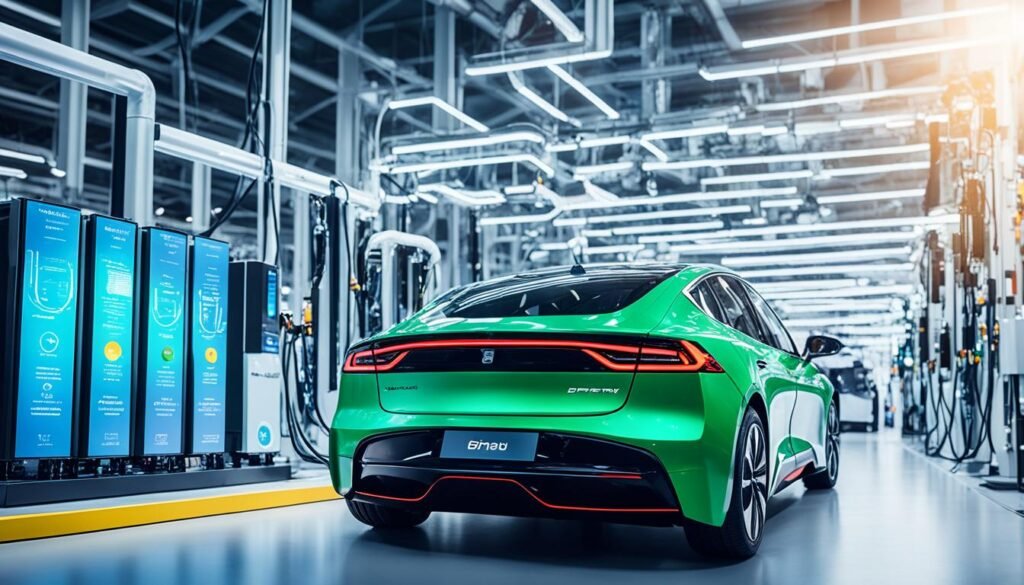
Lithium-ion batteries are commonly used in today’s electric vehicles. Yet, new battery types like Nickel Manganese Cobalt (NMC) and solid-state are under development. These could enhance how EVs work.
Nickel Manganese Cobalt (NMC) Batteries
NMC batteries have key benefits compared to usual lithium-ion ones. They charge quickly and last a long time, attractive features for EV drivers. They also pack more energy in a smaller size. But, they require expensive materials like nickel, manganese, and cobalt.
Solid-State Batteries
Solid-state batteries bring a new dimension to EV battery technology. They eliminate the use of liquid electrolyte for a solid one. This change means better safety and faster charge capabilities. EVs could see better performance and increased range with these batteries. Yet, their cost and complex production slow their entry into the market.
Ongoing research aims to make these new batteries more accessible. They could fundamentally change EVs, addressing issues of range, charge time, and safety.
“The future of electric vehicles is closely tied to advancements in battery technology. Emerging technologies like NMC and solid-state batteries have the potential to address the key challenges facing EVs today.”
Lithium-Sulfur Batteries: Cost-Effective Energy Storage
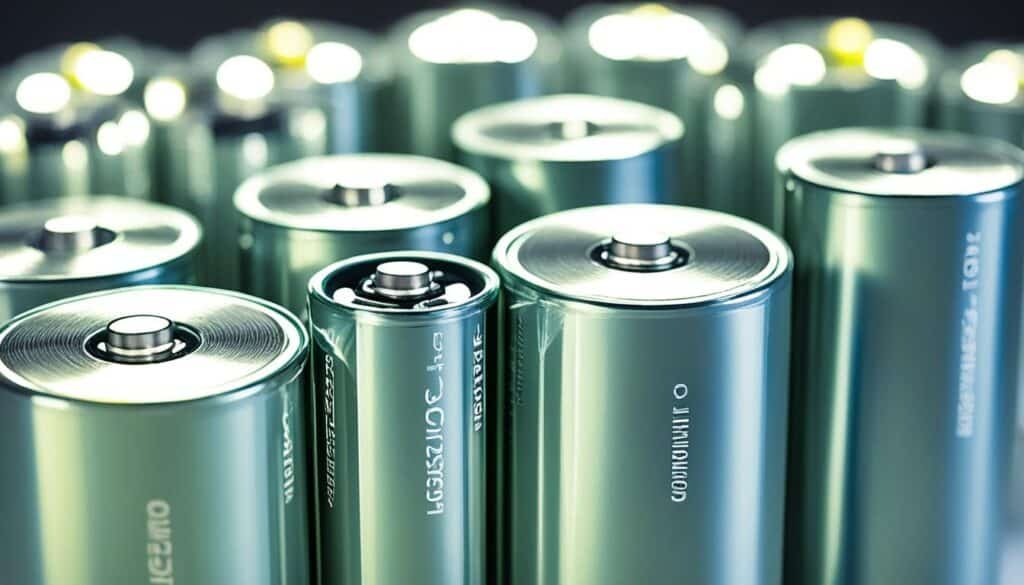
Lithium-sulfur batteries are an emerging choice for electric vehicles over the usual lithium-ion. They use sulfur as their main material, which is cheap and easy to find. This makes them a good pick for car makers who want to keep costs down.
Lithium-sulfur batteries can hold more power. This means electric cars can drive farther. Sulfur’s special properties let it store more energy than other materials in lithium-ion batteries.
| Characteristic | Lithium-Ion Batteries | Lithium-Sulfur Batteries |
|---|---|---|
| Energy Density | 150-250 Wh/kg | 300-600 Wh/kg |
| Cost | Higher | Lower |
| Lifespan | Longer | Shorter |
But, there’s a downside. Lithium-sulfur batteries don’t last as long. The sulfur can wear out, so these batteries have a shorter lifespan than lithium-ion ones. This means car makers have to think hard about the technology they choose for their electric cars.
“Lithium-sulfur batteries have the potential to significantly reduce the cost of electric vehicles, but their limited cycle life remains a major hurdle to overcome.”
Even though lithium-sulfur batteries have a downside, they still offer big benefits. They cost less and can store more energy. This makes them appealing for electric cars that need to be affordable.
As technology gets better, lithium-sulfur batteries might last longer. This could make them a more common choice in making electric cars. So, even with challenges, they show a lot of promise.
Key Players in EV Battery Innovation
Many companies and groups worldwide are working on better electric vehicle batteries. The U.S. Department of Energy and Toyota are leading this change. They are making EV batteries more powerful and longer-lasting.
U.S. Department of Energy’s Lithium-Ion Breakthrough
The U.S. Department of Energy is focusing on improving lithium-ion batteries for electric cars. Their work has led to stronger batteries that can charge faster. This means electric cars can run further and get charged quickly.
Toyota’s Solid-State Battery Advancements
Toyota is making breakthroughs in solid-state batteries for electric vehicles. Their batteries are now cheaper, last longer, and charge faster. This is a big step in finding better ways to store energy for cars.
These advancements are making electric cars more appealing. They will soon have longer ranges and quicker recharge times. This push for better batteries will make electric vehicles a top choice for many people.
Evaluating Battery Technologies for EVs
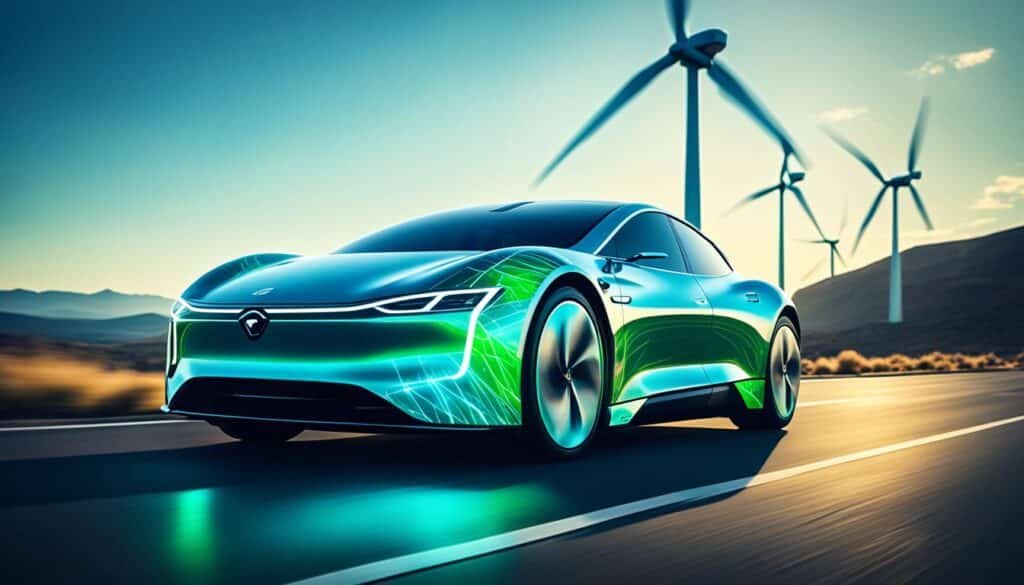
The electric vehicle (EV) market is changing fast. Choosing the best battery technology is vital for both makers and buyers. Important things to consider are: EV battery charging speed, EV battery energy density, and EV battery cost.
Charging Speed
Quick charging is a top concern for EV owners. Thanks to lithium-ion technology, recharging is speedier than ever. The latest batteries can charge at 150 kW, cutting full charge times to just 15-20 minutes.
Energy Density
Battery energy density is key for how far an EV can go on one charge. Though new types of batteries offer more potential, so far lithium-ion does well balancing energy storage and weight. This lets EVs go over 300 miles on a charge.
Cost
The price of batteries matters a lot for makers and buyers of EVs. Lithium-ion batteries are now cheaper because they are made more and sold widely. The aim of further research is to keep cutting battery prices. This will make EVs more affordable for everyone.
Choosing the right battery technology for EVs is crucial. The three main factors – charging speed, energy density, and cost – really shape the EV industry’s future. Finding the best balance in these areas is needed for more people to choose EVs. It’s also key for a greener, more sustainable way to get around.
Safety and Durability Considerations
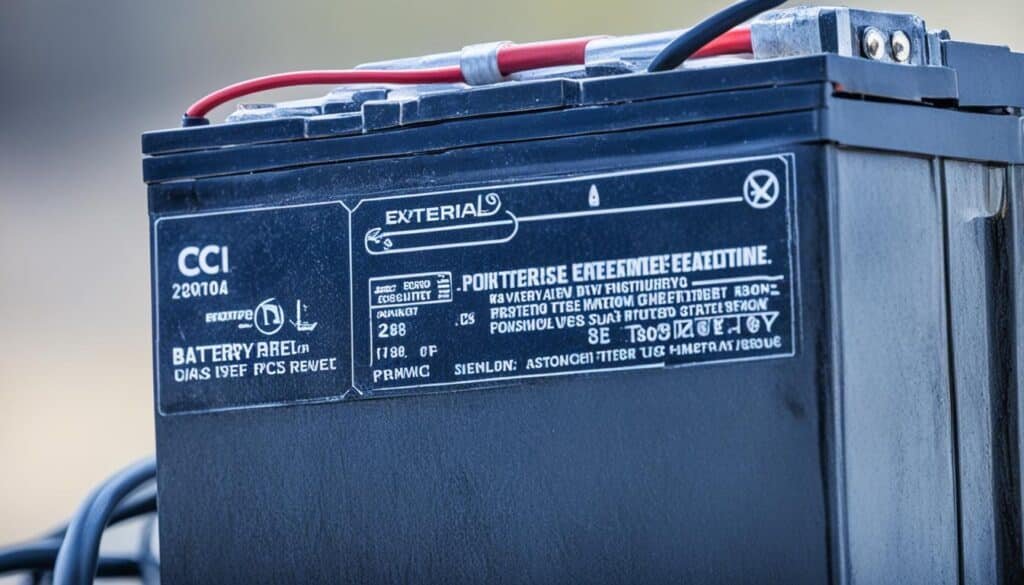
Choosing EV battery technology involves looking at safety and how long they last. Lithium-ion batteries are the top choice for EVs. They are designed and handled carefully to be safe. As the EV world grows, newer batteries might be even safer. Things like solid-state and lithium-sulfur batteries could lower risks of leaks or fires.
For those driving EVs, durability matters a lot. They want batteries to last a long time and charge well every time. Lithium-ion batteries have gotten better at this. But, research keeps going to make EVs last longer and work better. This helps fight battery degradation, making EV battery durability a big issue.
Ensuring EV Battery Safety
- Proper thermal management systems to mitigate the risk of overheating
- Advanced safety features like overcharge protection and short-circuit prevention
- Rigorous testing and certification processes to validate battery safety
Improving Battery Lifespan and Durability
- Advancements in battery chemistry and materials to enhance battery safety and lifespan
- Innovative battery management systems to optimize charging and discharging cycles
- Continuous research to address EV battery degradation and extend usable lifetime
“Ensuring the long-term safety and durability of EV batteries is critical for widespread adoption and consumer trust in this technology.”
The EV market is always changing. Developing safer, longer-lasting batteries is key for electric vehicles’ future. It takes teamwork from manufacturers, researchers, and policymakers. They’re working together to make the most of this new way to get around.
Future Of Electric Vehicles: Longer Range and Faster Charging
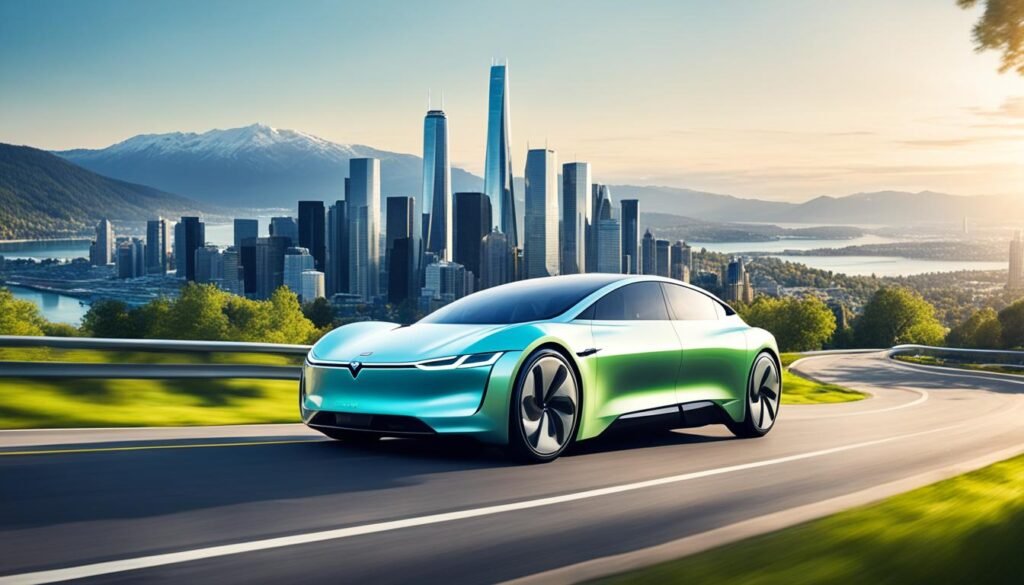
The electric vehicle (EV) industry is growing fast. Thanks to new battery tech, we’ll soon see EVs with longer ranges and faster recharge times. This addresses worries like range anxiety and the hassle of finding a charging spot.
Lithium-ion technology is at the forefront. With each step forward, these batteries store more energy. So, EVs can go farther without worrying about finding the next charge point.
The dream of faster EV charging is also quickly becoming a reality. New fast-charging methods are cutting down wait times to mere moments. This big leap is making electric cars more appealing and doable for a lot more people.
But it doesn’t stop at lithium-ion. Solid-state batteries are making waves too. They promise even better energy storage and quick charging, pushing the EV future even further.
With every battery breakthrough, the allure of EVs grows. Soon, driving electric will be even more enticing and simple. This paves the way for cleaner, greener roads worldwide.
| Feature | Current EVs | Future EVs |
|---|---|---|
| Driving Range | 250-400 miles | 500+ miles |
| Charging Time | 30 minutes to several hours | 10-20 minutes |
| Battery Technology | Lithium-ion | Solid-state, advanced lithium-ion |
“The future of electric vehicles is all about pushing the boundaries of battery performance to deliver longer ranges and faster charging times. These advancements are crucial for driving widespread EV adoption and realizing a more sustainable transportation future.”
EVs are getting more exciting every day. With better batteries, longer trips are no problem. Plus, quick charges make owning an EV simpler for everyone. Step by step, our roads are becoming cleaner and more sustainable.
Challenges and Opportunities in EV Battery Development

The electric vehicle (EV) industry is making big strides in battery tech. But, there are still big issues to deal with, especially in making batteries at a large scale. New battery types, like solid-state and lithium-sulfur, are complicated and need a lot of resources to make. This makes them hard to use widely and keep prices low.
Car makers and battery devs need to make these batteries cheaper to suit everyday cars. They must find easier ways to make batteries and cut down on the costs. To do this, they’ll need new ways to manufacture, and they’ll have to work with others to invest in the needed stuff.
Manufacturing and Scalability
Making EV batteries faces more hurdles than just making them better. It’s tough to make many at a good quality and keep them safe. Makers have to figure out how to mass-produce these advanced batteries without problems.
Environmental Impact
EVS have an important issue to deal with: the environmental impact of EV batteries. The materials in some batteries can harm the environment a lot, especially when we get them and make them. We need to find ways to make batteries without hurting the planet. This includes making them in a green way and reusing them when we can.
However, there are big opportunities in EV battery development, too. Investing in new tech and how we make batteries, as well as being more environmentally friendly, can make electric cars the top choice for the future.
“The future of electric vehicles depends on the advancements in battery technology. Addressing the challenges in manufacturing and environmental impact will be crucial for widespread adoption.”
Emerging Trends and Futuristic Concepts
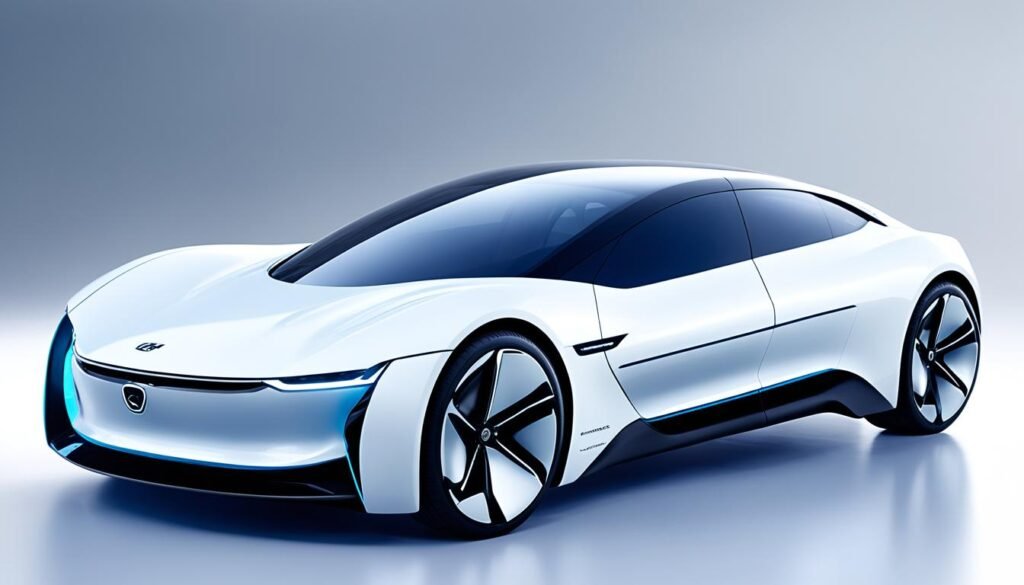
The future of EV battery technology is looking bright. Beyond just making current designs better, researchers are looking into new ideas. These could change how we power and charge electric vehicles in big ways.
Wireless Charging for EVs
One amazing idea is wireless charging. It means vehicles can recharge without needing a physical plug. This tech uses radio waves or ultrasound to send power from the charging pad to the car. This makes charging super easy – you just park your car and it starts recharging, no plugging in needed.
Nanowire Batteries with Unlimited Lifespan
Then there’s the nanowire battery, made with gold nanowires thinner than a hair. These batteries can be charged over 200,000 times without getting worse, meaning they could last forever. Such a battery would deal with a major EV issue – how often they need new batteries.
| Emerging EV Battery Trends | Description |
|---|---|
| Wireless Charging | Allows EVs to be recharged without physical plug-in connections, using radio waves or ultrasound to transmit power. |
| Nanowire Batteries | Utilizes gold nanowires that are thousands of times thinner than a human hair, with the ability to be recharged over 200,000 times without degradation. |
These futuristic futuristic EV battery concepts are pushing the boundaries. The future of electric vehicles will be more convenient, efficient, and eco-friendly. As the emerging EV battery trends get better, we’ll see improvements in wireless charging for electric vehicles and nanowire batteries with unlimited lifespan.
Also Read: What Are The Latest Technology Applications In Agriculture?
Conclusion
Electric vehicle battery tech is changing the auto industry’s future. We now see a shift from lithium-ion to new batteries like NMC, solid-state, and lithium-sulfur as the go-to sources for EV power.
The U.S. Department of Energy and Toyota are leaders in battery tech advances. They’ve given us batteries that last longer, charge quicker, and are more pocket-friendly. These new solutions address making, scaling, and eco concerns.
The electric car market is booming and looking brighter every day. Pretty soon, we could have cars that drive much farther, charge in a flash, and help our planet more. Imagine cars charging without wires or batteries that last forever. It’s these amazing advances that are changing how we drive and use cars.
FAQs
What are the key battery technologies powering modern electric vehicles?
In the world of electric vehicles, lithium-ion is the go-to type of battery. Yet, we also see up-and-coming technologies. These include nickel manganese cobalt (NMC), solid-state, and lithium-sulfur batteries.
What are the advantages and disadvantages of different EV battery types?
Lithium-ion batteries are known for being light and efficient. They also work well in a variety of temperatures. NMC batteries, on the other hand, charge quickly and last longer. But, they are more expensive.
Solid-state batteries are safer and transfer ions faster. However, they are hard to make. Lithium-sulfur batteries are cheaper and store a lot of energy. But, they don’t last as long between charges.
Who are the key players driving innovation in EV battery technology?
The U.S. Department of Energy is a big name in making lithium-ion batteries better. Then, we have Toyota leading the way in solid-state batteries.
What factors are important when evaluating the best battery technology for electric vehicles?
When picking the right battery for electric cars, speed, power, and price matter a lot. Right now, lithium-ion batteries are a good mix of all these. But, new types like solid-state and lithium-sulfur batteries might do better in the future.
What are the key challenges and opportunities in the development of EV battery technology?
The big hurdles are how to make batteries on a large scale and their impact on the environment. But, there are exciting chances with things like wireless charging and new types of batteries. These could change how we think about powering and charging electric cars.
Source Links
- https://www.sparkcharge.io/blogs/leadthecharge/the-future-of-evs-ev-battery-technology-advancements
- https://www.greencars.com/greencars-101/the-future-of-ev-batteries
- https://www.cbsnews.com/sanfrancisco/news/quest-better-battery-technology-may-determine-future-ev-market/
